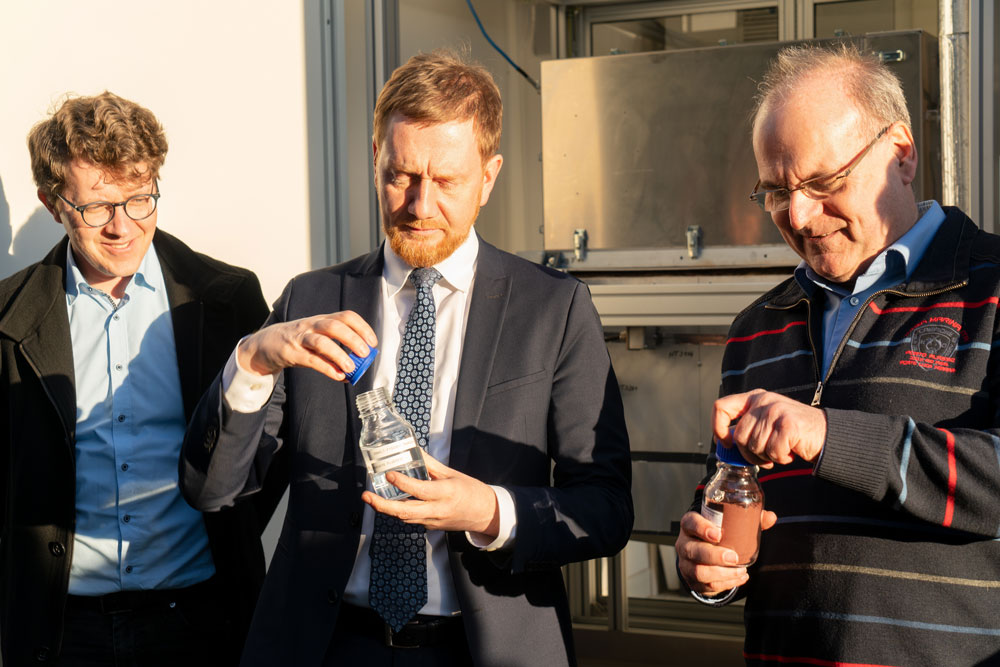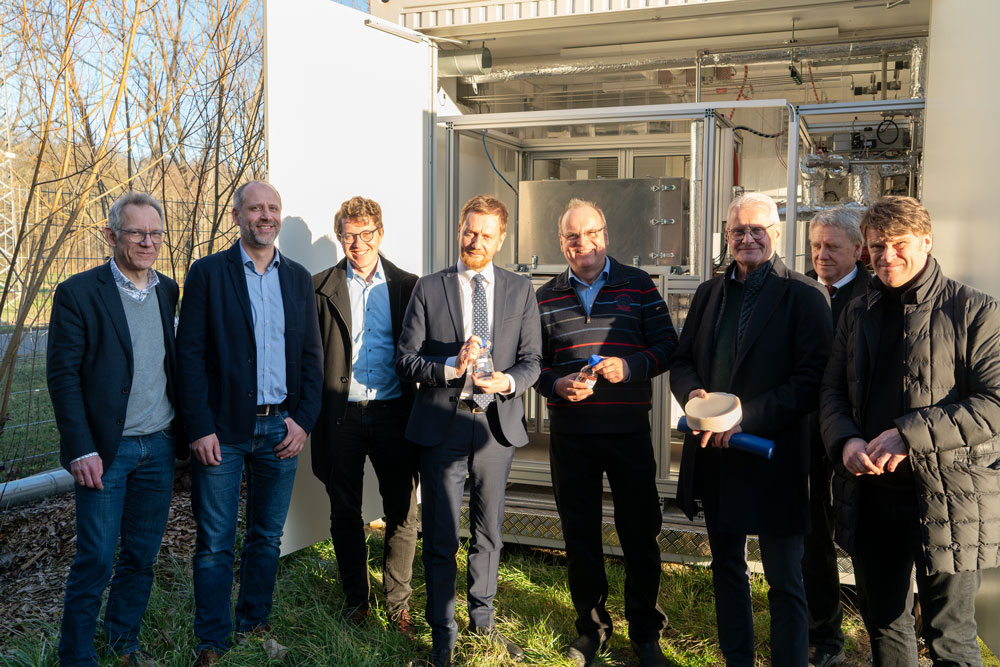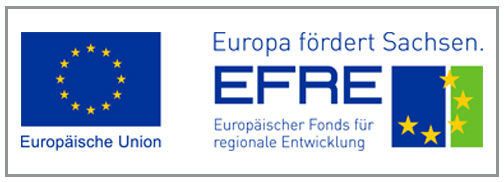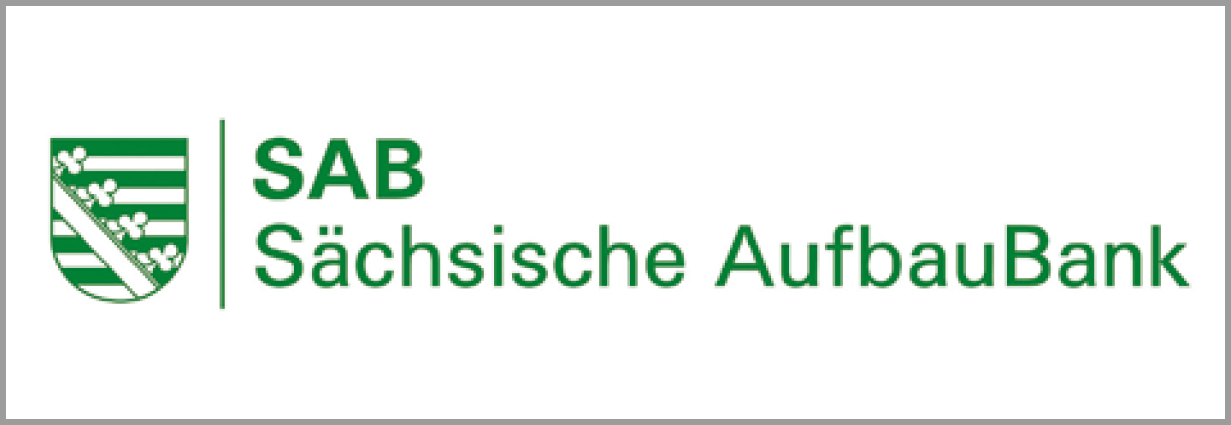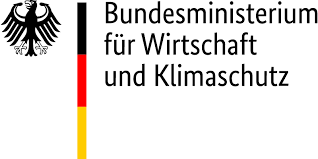Securing energy and raw material sovereignty through regional circular technologies
Minister President Kretschmer visited the Thallwitz pilot plant today to find out in person about the Saxon initiative to develop regional CO2 sources for a resilient chemical and fuel industry.
The expansion of regional material cycles is a key element in making central German industry independent of fossil raw materials. CO2 from sustainable sources, such as biogas, is of particular importance in this context. The carbon contained in it can be converted into essential basic materials for the chemical industry as well as into green kerosene for aviation via catalytic and electrochemical processes as well as subsequent material syntheses. A powerful consortium consisting of the research institutes Fraunhofer IKTS, TU Bergakademie Freiberg and TU Dresden with the Saxon companies Ökotec-Anlagenbau GmbH, Sunfire GmbH and DBI Gas- und Umwelttechnik GmbH has already successfully demonstrated in several projects how this can work on an industrial scale. Together with EDL Anlagenbau Gesellschaft GmbH, scaling up to large industrial scale is now planned. Among other things, Fraunhofer IKTS is contributing its many years of expertise in ceramic electrolysis cells and the development of plant concepts, which have been validated in the Thallwitz biogas plant since 2019.
"Excellent research and modern technologies are important building blocks on the way to less dependence on raw materials," emphasizes Minister President Michael Kretschmer on site in Thallwitz. "The utilization of biomass offers enormous potential here. The fact that not only energy but also high-quality chemicals and e-fuels can be obtained from it is impressively demonstrated by the Fraunhofer IKTS pilot plant in Thallwitz. Making this groundbreaking technology applicable to industry together with partners from the region would be a great gain for structural development in the Central German mining region."
Prof. Alexander Michaelis, Institute Director of Fraunhofer IKTS, elaborates: "In Thallwitz, we demonstrate technologies in real operation that enable an efficient economic and ecological circular economy. By using CO2 as a carbon source, we can produce important chemical products not only CO2-neutral, but even CO2-negative. For the first time, we are demonstrating how synthesis gas can be obtained both from the reforming of biogas and by using so-called co-electrolysis. In the field of ceramic high-temperature and co-electrolysis (SOE: solid oxide electrolysis), we have unique selling points worldwide. This is also important for the production of green hydrogen. Due to the active use of waste heat, SOE has over 30 % higher efficiency for electricity-to-hydrogen conversion compared with all competing technologies. This is a crucial success factor for the energy transition. The solution options developed, which now have to be scaled up, will help to ensure security of supply. For the companies involved, this will result in significant national and international exploitation opportunities (keyword exports)."
Together, the players are now laying the foundation for the transfer to application.
"In hardly any other industry is the pressure as high as in the chemical and aerospace industries to find fast and economically sensible strategies for the supply of raw materials," adds Dr. Rüdiger Schwarz, Head of Strategic Communication PtX Projects at EDL Anlagenbau Gesellschaft mbH. "At the same time, of course, with the right technologies, there are also incredible opportunities for players in plant engineering, the manufacturing industries and thus the entire region of Central Germany."
For an economic production of high-quality basic chemicals based on regional biogenic residues, a scaling of the conversion processes and plants is necessary. To this end, further investigations into process optimization are planned in the joint project with the experienced plant manufacturer EDL, which will also include the processing of the products from the Fischer-Tropsch synthesis. The project consortium is also conducting a site analysis to identify a suitable location for a plant on a technically relevant scale. Based on these findings, a techno-economic evaluation of the process, the design of a plant and preparations for implementation at an existing biogas plant in the central German mining region will be carried out.
The work is integrated into existing projects in the region at the Böhlen Chemical Park, the refinery in Leuna and at Leipzig/Halle Airport, where the regional production of synthetic kerosene is being evaluated in terms of economic and technological issues. In close coordination with the IPCEI project "HyKero", further processes for the use of biogas are also being developed. Together, these projects are setting the course for a sustainable supply of energy and raw materials to the industrial centers of central Germany.
